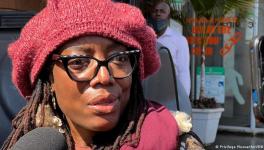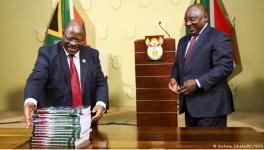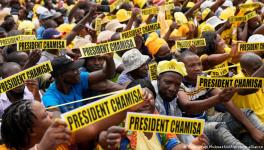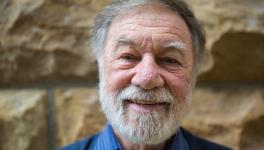Political Uncertainty Continues in Zimbabwe After Military Mutiny
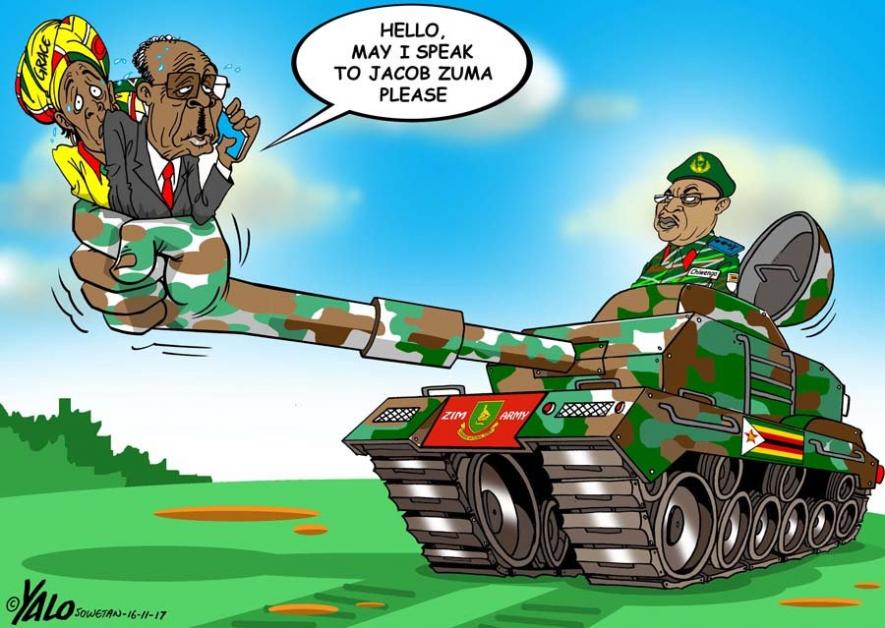
The African Union (AU) and Southern African Development Community (SADC) have expressed their concerns over the political tug-of-war unfolding in Zimbabwe. On Wednesday, country’s military forces took over the power and detained 93 yr old President Robert Mugabe.
After days of tension and rumour, soldiers seized the state broadcaster ZBC late on Tuesday.
Since then, military vehicles have been out on the streets of Harare, while gunfire has been heard from northern suburbs where Mugabe and a number of government officials live.
The military denied staging a coup and said that Mugabe is safe and that it was acting against "criminals" surrounding him. A Zimbabwean army officer, Major General Sibusiso Moyo also said Mr Mugabe and his family were "safe and sound and their security is guaranteed". It is not clear who is leading the military action.
Calling the events as a ‘possible coup’ the AU demanded an immediate return to the constitutional order, reported BBC. In a statement, the office of South African President Jacob Zuma, said: "President Zuma spoke to President Robert Mugabe earlier today who indicated that he was confined to his home but said that he was fine.”
Meanwhile, an urgent foreign ministers meeting of SADC has been called to discuss the unfolding political and security situation in neighbouring Zimbabwe.
Zuma on Wednesday dispatched an envoy to turmoil-hit Harare to hold discussions with the military and Zimbabwean President Mugabe.
Mugabe has dominated the country's political scene since it gained independence from the UK in 1980. His vice-president, Emmerson Mnangagwa, known as ‘The Crocodile' was fired last week, leaving the top military officials feeling sidelined.
After sacking his deputy, Mugabe had expressed that his wife, Grace will be his likely successor. The move had created a rift in the country’s powerful military force.
Military had always been in favour of a war veteran from country’s liberation struggle to rule the country. Putting his wife Grace, who is not a veteran, as his next successor, Mugabe had broken this, thus angering many.
According to political experts, the battle was within the ruling Zanu-PF party but had broader significance too: a generational struggle between the veterans of the wars of the 1970s and 1980s and the ambitious younger challengers.
The Zanu-PF Generation 40, or G40 for short, is a group of Zanu PF politicians believed to be working against the possibility of Emmerson Mnangagwa (Lacoste Faction) succeeding President Robert Mugabe as president of Zimbabwe. This fraction was led by First Lady Grace Mugabe.
The present military action seems to be targeting the members of this G40 group. According to reports, many members of the groups have been rounded by the army, and Grace had left for Namibia.
On Monday, Constantine Chiwenga, the Zimbabwean army chief had warned that the military would step in if the country’s stability and security were threatened.
Get the latest reports & analysis with people's perspective on Protests, movements & deep analytical videos, discussions of the current affairs in your Telegram app. Subscribe to NewsClick's Telegram channel & get Real-Time updates on stories, as they get published on our website.













